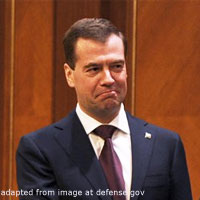Russian PM urges ‘spending optimization’ to meet welfare pledges

(Interfax – Gorki, April 3, 2013) Russian Prime Minister Dmitriy Medvedev has said the social obligations taken by the state are unconditional and set the task of optimizing spending in this area.
“A very considerable sum is provided for these purposes (in the social sphere) in the federal budget this year: over R5,000bn (about 160bn dollars at the current rate of exchange),” Medvedev said when he opened a meeting on social policy funding. (A report on state-controlled Russian Channel One TV showed Medvedev giving details of the social obligations in question: “This is about raising wages in education, culture, health care, social services and science; and of course about raising grants for first- and second-year students, about additional funding for state research funds, about monthly cash payments to families for the birth of a third and subsequent child until the child reaches the age of three.”)
He stressed that the obligations that the state had taken upon itself in this sphere must be “met unconditionally” and that “there can be no other approaches” to this.
“The goal is to analyse the structure and content of the social sections of the budget, concentrate the funds on meeting top-priority objectives, optimize spending,” Medvedev said. He noted the need to find internal reserves in this, explaining that he meant the ratio of administrative staff to core staff, in particular teachers, medical workers and cultural workers. “The efficiency of use of state property, above all federal property, should be analysed for reduplication of functions,” Medvedev said. Furthermore, extra-budgetary funding should be used when possible, and state-private partnership should be introduced as widely as possible. (Passage omitted: repetition)
“We have to find the best management solutions; this, in fact, is what the government’s task is,” the head of the government said.
Medvedev also announced that he waited for suggestions from government members on how to encourage more active GPD growth.
